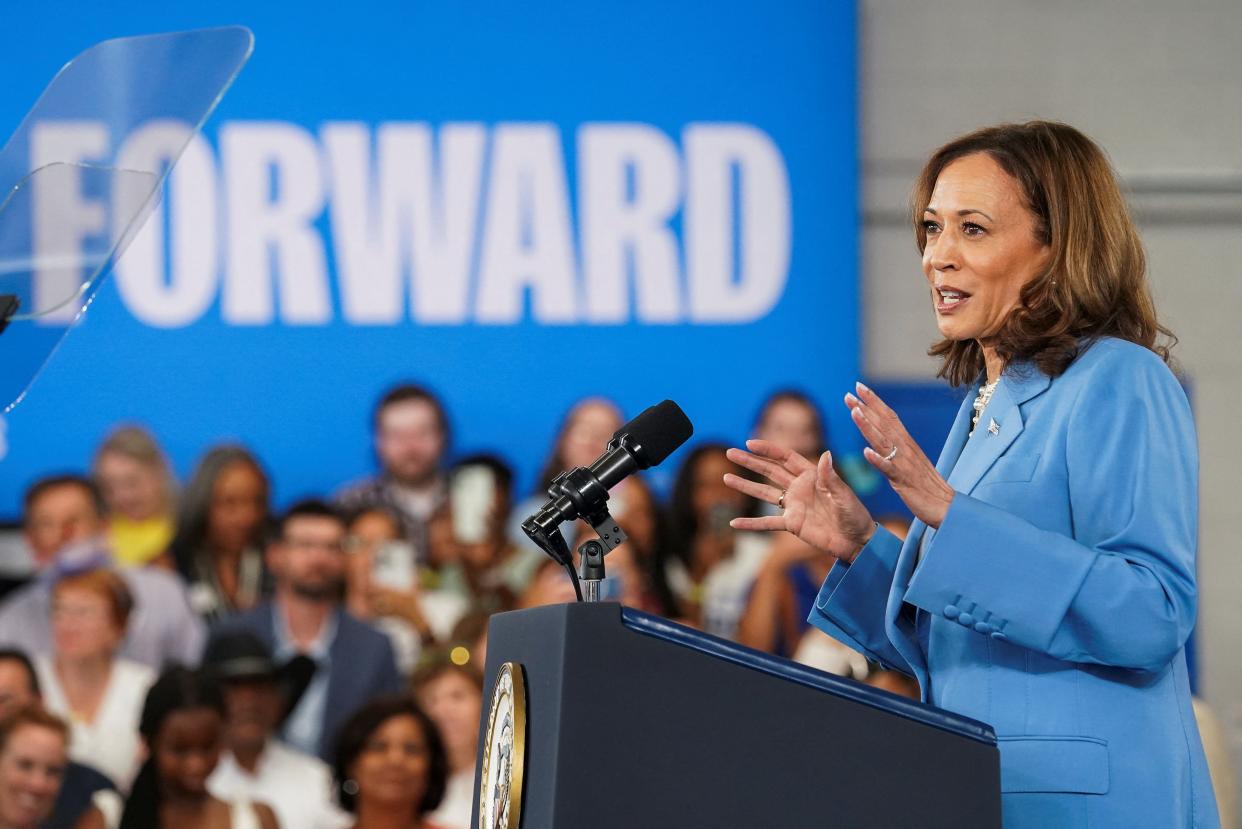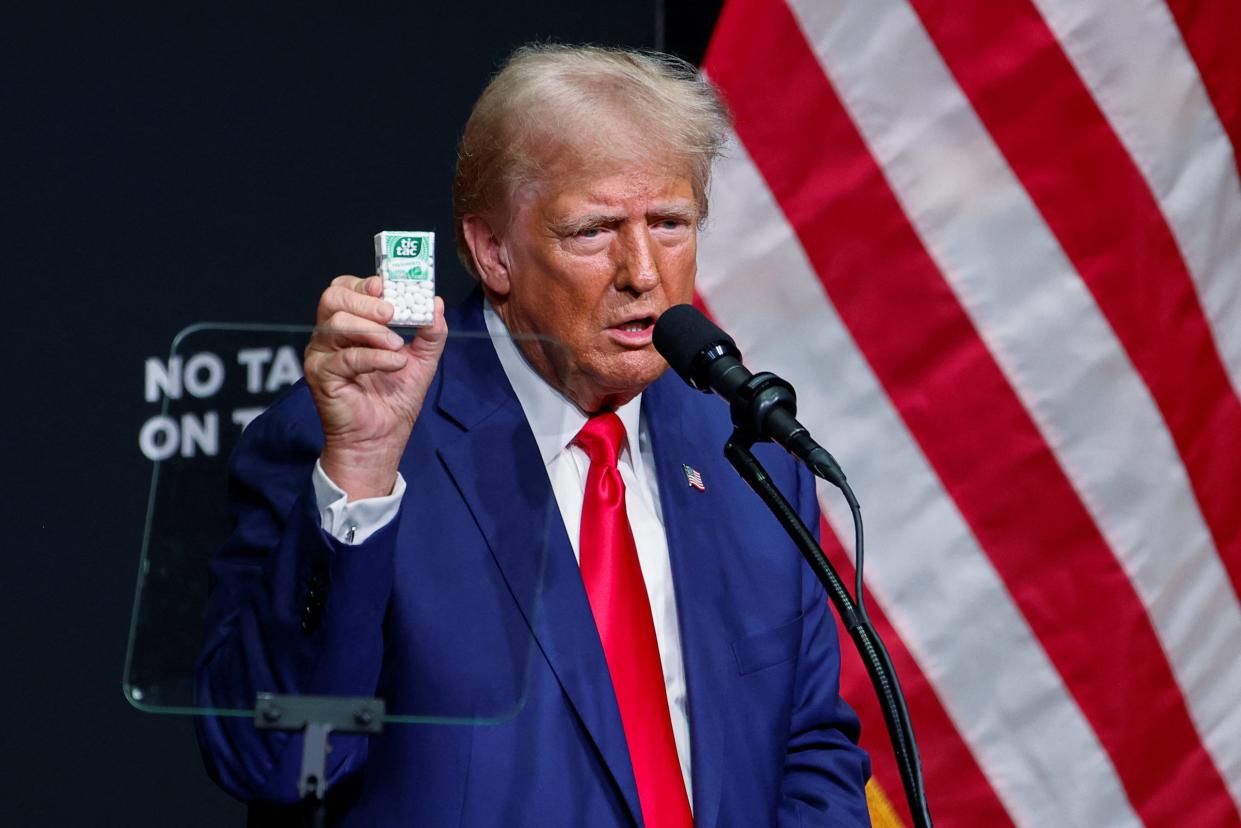Trump and Kamala Harris fail Econ 101. Their plans are nothing less than 'fiscal lunacy'
Former President Donald Trump and Vice President Kamala Harris have found common ground in rejecting sound economics in favor of populist politics.
Both major party candidates have settled on cringeworthy policies which sound wonderful if Americans suspend brain function and ignore the consequences. Pointing out what voters care about most, James Carville famously noted, “It’s the economy, stupid.”
We should find politicians who actually understand how it works.
Ignore Harris and Biden’s talking points that corporate greed is driving high prices. The Federal Reserve Board of San Francisco (FRBSF) evaluated such claims earlier this year and found “rising markups have not been a main driver of the recent surge and subsequent decline in inflation during the current recovery.”
Truth and politics often diverge where there is a useful scapegoat.
Political leaders contributed to corporate profits and inflation
Did we really expect Trump and Harris to take responsibility for economic decisions that caused radical inflation and led to our current economic situation?
Unlike the economists at the FRBSF, the candidates won’t tell you that “much of the recent rise in corporate profits can be attributed to lower business taxes and higher subsidies from pandemic-related government support, as well as lower net interest payments due to monetary policy accommodation.”
In short, the rise in corporate profits is largely the government’s doing. While corporations are presently viewed less favorably than a cobra covered in tarantulas, our political leaders are far more of a problem than manufactured price gouging.
Let’s address the economic gorilla in the room: inflation.
To help struggling households and businesses during the COVID-19 pandemic, the Federal Reserve dropped the federal funds rate target to zero. Meanwhile Congress blew money out the door in the form of stimulus checks and enhanced unemployment benefits. In case you missed it, most politicians regardless of party agreed on the COVID-19 bailout plan. Americans cashed government checks in red states as well as blue.
The result was an insane amount of deficit spending and cheap money driving demand for goods and services. In plain English, people had more money to buy stuff. The fly in the ointment was that shutdown policies around the world created supply chain disruptions. Too much money chased after too few goods and services. Prices went through the roof during the post-pandemic recovery and never came down.
In response, the Federal Reserve tried to dry up the flood of cash by hiking interest rates. Congress has been spending less than it did during the height of the pandemic, but it hasn’t gone back to pre-pandemic deficit spending levels.
While the inflation rate has indeed retreated, prices for consumers remain extremely high.
Removing taxes on tips could have adverse effects
Against that backdrop, the only economically viable path is to ensure that wages now grow faster than inflation while pulling back federal deficit spending.
So what do the aspiring leaders of the free world propose to do?
Harris and Trump agree we must first remove taxes on tips. According to Yale’s Budget Lab, tipped occupations account for 2.5% of all employment. While the idea would certainly increase take-home wages for a microscopic sliver of the American workforce, it creates several unintended consequences.
Most salaried workers would immediately ask to drop their salary to nearly zero and request their compensation be awarded in the form of tips for services rendered. Harris and Trump would necessarily need to craft real limitations on the measure to avoid the destruction of the American income tax base.
Even then, the incoming administration would simply be picking economic winners and losers. Why not cut federal taxes on first responders? How about classroom teachers? I’m rather partial to cutting taxes on columnists. If we’re going to reduce the tax burden on America, we should slightly decrease rates for everyone rather than radically dropping taxes on one group of workers.
Candidates are trying to outdo each other on economy illiteracy
If cutting taxes on tips weren’t silly enough, both Trump and Harris seem to agree that we should levy serious tariffs on foreign goods. Trump imposed significant tariffs during his term in office that have cost Americans more than $230 billion.

The Biden-Harris administration kept most of them in place. Tariffs are a tax on American consumers because they’re assessed on importers who pass the costs along in the form of higher prices.
The foolishness of the government artificially ratcheting up the cost of goods during a period of high inflation is laughable. According to the Tax Foundation, the Trump-Biden tariffs manage to increase consumer prices and cause a net reduction in employment.
Trump and Harris also share the idea that families who make under $400,000 should receive radically expanded tax relief for raising children to the tune of $5,000 or $6,000 per child. As a father of four boys, I say, “Amen!” I am personally happy to keep more of my family’s income instead of sending it to the federal laundering machine to pay for inefficient programs purported to help families.
As much as I love the idea, we can’t ignore the current inflationary environment.
Those tax cuts would likely pump a few hundred billion dollars a year into the economy. While the cut isn’t direct spending, Congress will almost certainly borrow more money instead of reducing outlays to offset forgone revenue.
Letting people keep more of their wages is ideal for combating inflation; artificially injecting more dollars into the economy is not.

Where Trump will drive prices higher with even more burdensome tariffs, Harris will not be outdone in the area of economic idiocy. She intends to provide working families who have dutifully paid their rent with up to $25,000 or more in down-payment assistance. Harris appears willing to give those first time homebuyers a $10,000 credit to boot.
I’m a little surprised that the candidates aren’t handing out even more goodies to key electoral constituencies. If both are so willing to ignore basic economic principles, why stop?
The candidates offer no solutions for reducing national debt
If we’re serious about addressing inflation, we need broad based tax reductions which accelerate wage growth combined with regulatory reforms which enable businesses to compete for those dollars. It wouldn’t hurt to incentivize businesses to put more of their earnings toward employee compensation.
We can’t and shouldn’t do any of that without materially reducing federal spending at the same time.
Unfortunately, neither Trump nor Harris seem particularly interested in reining in the political largess. America is hurtling towards a point where the interest payments on our national debt will be more than $1 trillion per year.
Sorry, Democrats, there just aren’t enough ultra-wealthy people who can “pay their fair share” to pick up the astronomical tab Congress continues to ring up.
Regardless of who wins, voters must counteract the current fiscal lunacy from presidential contenders by electing members of the House and Senate with a much higher degree of economic literacy.

While I’m encouraged that Trump and Harris have found areas of agreement, their solutions will only exacerbate the grave economic situation both helped create.
USA TODAY Network Tennessee Columnist Cameron Smith is a Memphis-born, Brentwood-raised recovering political attorney who worked for conservative Republicans. He and his wife Justine are raising three boys in Nolensville, Tenn. Direct outrage or agreement to smith.david.cameron@gmail.com or @DCameronSmith on X, formerly known as Twitter. Agree or disagree? Send a letter to the editor to letters@tennessean.com.
This article originally appeared on Nashville Tennessean: Trump, Kamala Harris economic plans amount to more government meddling






